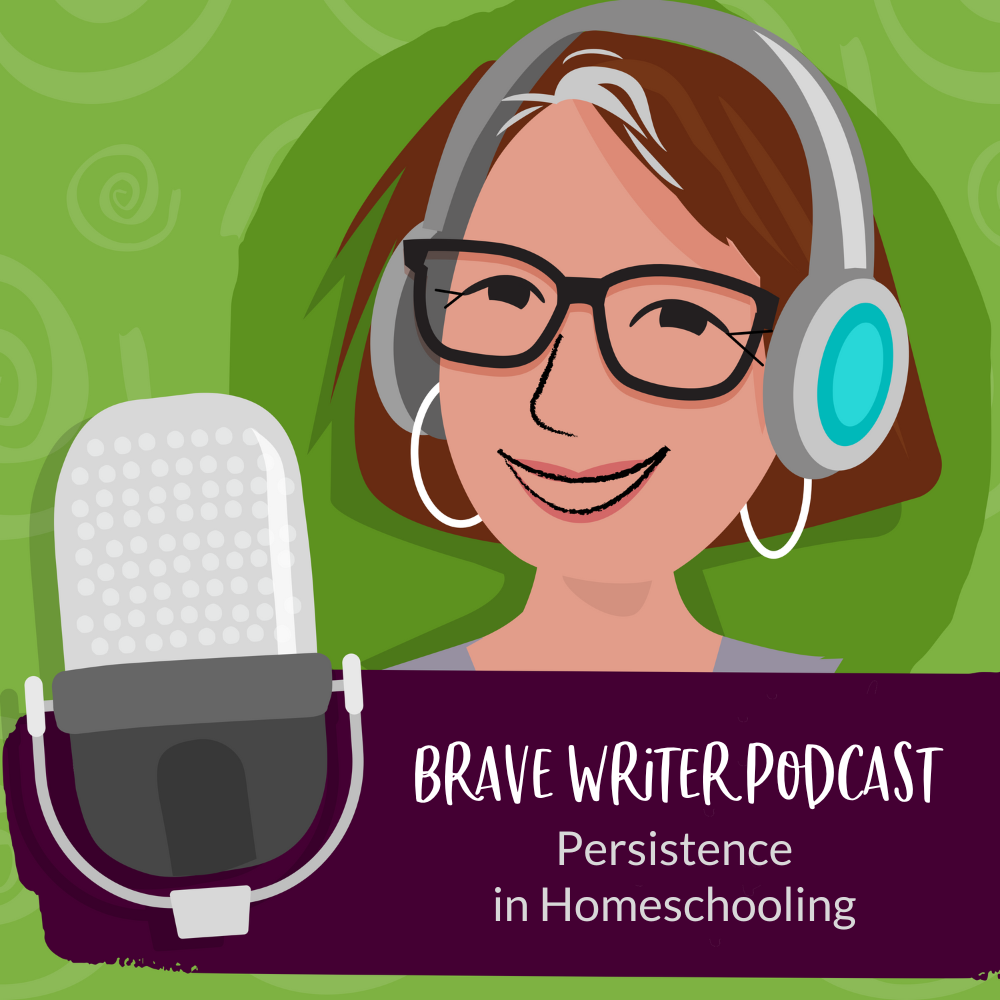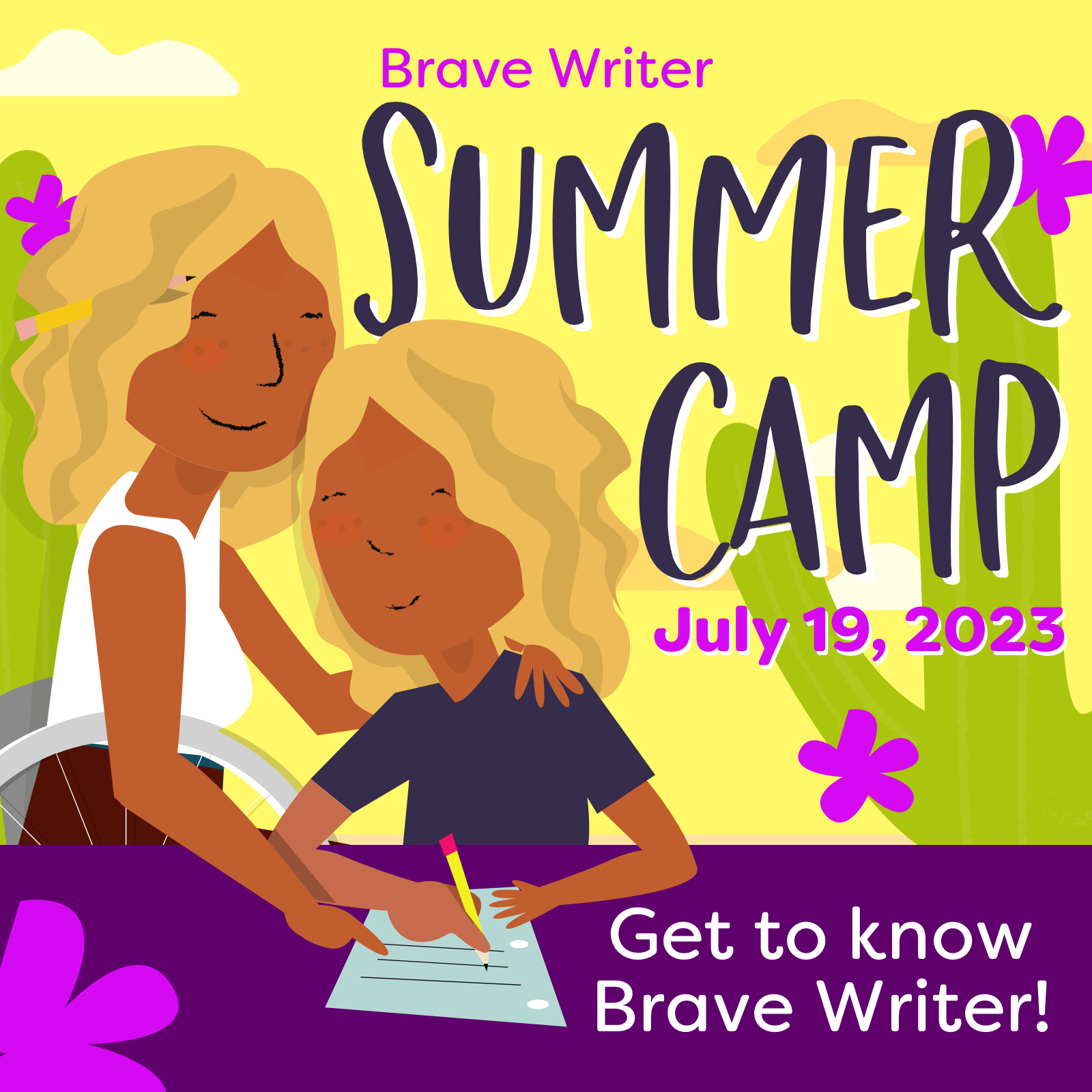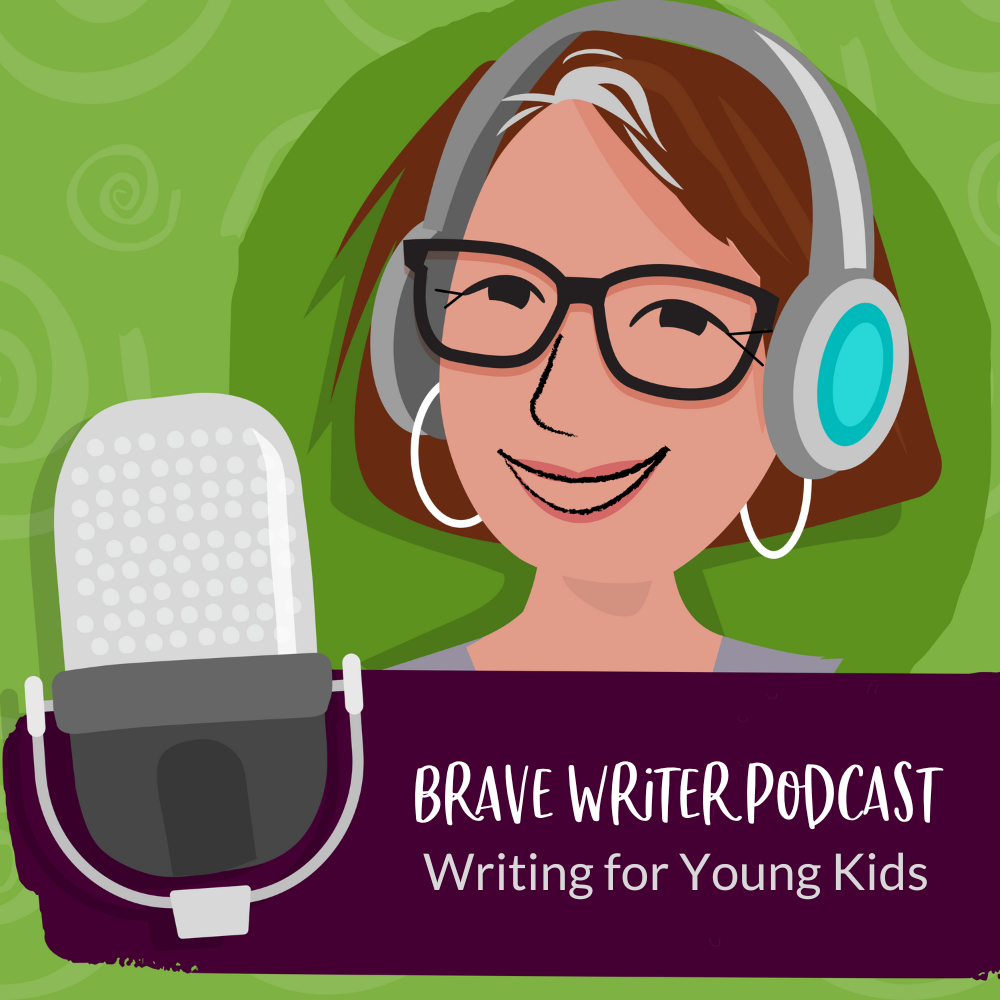
When playing Hide and Seek, would you rather be the one who hides or the one who seeks (or neither…or both!)? Explain your answer.
New to freewriting? Check out our online guide.

When playing Hide and Seek, would you rather be the one who hides or the one who seeks (or neither…or both!)? Explain your answer.
New to freewriting? Check out our online guide.
Tags: Writing prompts
Posted in Friday Freewrite | Comments Off on Friday Freewrite: Hide or Seek?

On today’s Brave Writer podcast, we discuss a topic that I believe is fundamental to the homeschooling journey: persistence.
Regardless of where you are in your homeschooling adventure—whether you’re still contemplating the idea, just embarking on your first year, already ten years deep, or even approaching your final year—it’s essential to understand what it takes to persevere.
My most frequently shared piece of advice is a simple but powerful one: “Keep going, keep going.”
But how exactly does one maintain momentum? How do we cultivate persistence?
Let’s explore this together today.
How do you persist in homeschooling?
Persistence has to do with having enough resources and training to be able to carry out an objective or goal. Leah talked about having a purpose as the undergirding foundation of your homeschool. We have to know why we are choosing to stay home with our kids. Once we do, then we want to create a context for how we create the conditions for learning to happen.
Naturally, we want:
We want to learn and grow. We want our children to WANT to be home with us, to want to learn, to want us to be their companions on the journey.
The trick is: we sometimes expect our kids to want all of what we offer even when they don’t. We blame them for not wanting to learn or cooperate or behave. We don’t think about what we can do to create the conditions for learning to thrive.
Sometimes we don’t notice that we are persisting with our wills but not with our hearts. And that’s okay: our job is to just notice, not to shame ourselves.
Take a moment to remember what it felt like to be a kid in your home. What is the lingering felt experience? What is the experience you want for yourself now? What is the experience you hope your children take away from being home with you?
We can’t pretend a healthy home life into being. Persistence depends on honesty because to sustain a homeschool, we have to like our lives together.
First, it must be understood:
The priority of school is: achievement.
Achievement means matching the expectations of the school system. We feel it as a shadow in the background no matter how well we lead our homeschools. We wonder: Have I done enough? How do I know that what I’m doing is preparing my kids for the future? I know—I’ll measure myself by schools! But there’s a problem with that. The measures in school come through assessments. That doesn’t work in the same way at home.
The priority of home is: connection.
Everything you want to accomplish can be accomplished through connection. Connection IS the priority of your homeschool. It is your top priority of family life. Through connection, you can address every single need for achievement!
To persist means to create the framework that allows you to pivot, grow, and immerse yourself in your children’s education.
So let’s dive into what those conditions are. I am going to talk about 6 concepts that all start with the letter C.
Citing the wisdom of T.S. Eliot, William May tells the story of a student pressing the poet with a question following his lecture, “Mr. Eliot, what are we going to do about the problem you have discussed?” To which Mr.Eliot replied, “You must understand that we face two types of problems in life. One kind of problem provokes the question, ‘What are we going to do about it?’ The other kind poses the subtler question, ‘How do we behave towards it?’” (May, 3)
The first type of problem evokes strategies and tactics so the problem can be solved – so it can “go away.” The second admits of no solution because the problem will not go away: “The problem will persist. It requires behavior that sensitively, decorously, and appropriately fits the perduring challenge…. it demands a response that resembles a ritual repeated more than a technique” (May, 4).
The shift is important—not all the troubles you experience in your homeschool need to be done away with. You and your kids have limits.
The enemy of a healthy home is pretense. We pretend that we have a certain kind of family. We pretend we aren’t worried. We pretend that we have solutions in six easy steps. We pretend that the pain we are feeling personally is not bleeding out on our children. We pretend that homeschooling is better than public school in all circumstances to avoid dealing with our limits and fears. We pretend that we agree with our spouses against our children to make peace.
Sometimes we are pretending with the highest motives—as if we can will our homeschools into our imagined fantasy.
Posted in Podcasts | Comments Off on Podcast: Persistence in Homeschooling

It’s Summer Camp time!
Our Brave Writer camp is designed for homeschool parents like you who need a little extra boost of support!
The day-long camp is packed with useful information about
Replays are available below.
Note: the discount has expired.
How to be a Happy Homeschooler (Julie Bogart)
What does it take to be a happy homeschooler? The answer may surprise you. Join Julie to get the inside scoop on creating the homeschool that’s just right for you and your family! With joy, delight, and yes, happiness!
Stress-Free Class Planning (Kirsten Merryman)
Planning a year of education can feel daunting. You may feel overwhelmed with the bounty of choices as you try to find the best class fits for your child over the course of an entire school year. Kirsten Merryman (Director of Online Classes) is here to help! Join us for a conversation about where to start and how to pace the learning for a rewarding and stress-free language arts experience.
Poetry Teatime (Melissa Wiley)
The incomparable Melissa Wiley (children’s novelist, homeschool veteran of six, Brave Writer podcast co-host and product writer) will host a Poetry Teatime! Melissa has been writing children’s books since 1995, including her Brave Writer featured books, The Prairie Thief and The Nerviest Girl in the World.
Unlocking Learning Through Literature (Dawn Smith)
Whether fiction, nonfiction, poetry, or fantasy, literature opens doors to a wide range of school subjects and learning adventures. Discover how grammar, punctuation, spelling, and literary devices can be taught naturally, while also inviting children into science, history, math, geography, and imagination. Dawn Smith (Director of Publishing) shares how!
Jumpstart Your Homeschool (Julie Bogart)
You’re ready to take the leap into homeschooling! Wish you had a safety net? A guide? A mentor? Jumpstart your homeschool with Julie to get all that and more. Six-weeks of hand-holding content with intimate sessions that will give you practical tools and implementable guidance—along with a supportive community!
Come learn more about how to Jumpstart Your Homeschool with Julie and our 14,000+ membership community, Brave Learner Home.
Posted in Webinars | Comments Off on Replays: Summer Camp 2023

Have you ever had a whole day, from sunrise to sunset, where everything seemed to go right (or wrong!)? Write about it!
New to freewriting? Check out our online guide.
Tags: Writing prompts
Posted in Friday Freewrite | Comments Off on Friday Freewrite: A Whole Day

At Brave Writer, we believe that writing is at the heart of education. Our approach is to teach kids to write by reading books they’ll love, and organically – but methodically – bringing up discussions that expand upon how the books were written.
The focus of today’s podcast discussion is the youngest among us: those just embarking on their literary journey, learning to read and write for the first time.
We’re going to delve deep into the fascinating process of developing the Quill, our groundbreaking educational tool specifically tailored for children aged five to seven. The Quill aims to foster early literacy and numeracy skills, providing an engaging foundation upon which children can build as they learn phonics, handwriting, and basic computation. It goes beyond traditional education methods, inviting children into the world of reading, writing, and math through:
This all-encompassing approach has seen the Quill become a beloved part of the Brave Writer program, loved not just by young learners, but older kids who gain tremendous value from revisiting the foundations of literacy.
What is the Quill?
The Quill is a comprehensive program comprising two writing activities, two reading activities, and two math activities. These thoughtfully curated tasks equip parents with the tools they need to facilitate their child’s development of pre-literacy skills.
In fostering the early stages of writing, the Quill encourages parents to transcribe their child’s thoughts and ideas. It’s important to note that this is not a conventional phonics or handwriting program. Rather, it is a supplement to such programs, enriching a child’s educational journey through physical kinesthetic learning.
The Quill emphasizes the development of fine and gross motor skills, print awareness, book anatomy, letter recognition, vocabulary development, and background knowledge. Furthermore, it inspires parents to kindle learning through big, engaging conversations, exploring questions driven by natural curiosity and thereby creating a more organic and engaging learning environment.
What do you get inside of the Quill?
Within the Quill, you will find a comprehensive guide to engaging educational conversations with your children, akin to the process of preparing for a podcast interview. The program begins with an introduction and a preview of the concepts to be covered, accompanied by a suggested thematic book list.
Each section of the Quill contains two activities, coupled with an introduction and a planning box for parents. These activities are intended to be completed over the course of a month, encouraging the repeated exploration of concepts in different contexts and iterations. Importantly, the activities in the Quill are not intended as one-off exercises, but as springboards for a multitude of learning experiences, sparking interest in a range of subjects from science and art to history.
The themes for the Quill
Themes within the Quill are thoughtfully chosen to resonate with children aged five to seven. Some of the exciting themes include:
It uses a combination of fiction and nonfiction in learning in order to add depth, context, and nuance to the child’s understanding of the topic.
Using the Quill alongside older kids
Despite being tailored for younger children, the Quill can easily be adapted for older learners, proving its versatility. By pairing the Quill activities with other resources, such as related literature for older children, parents can cater to a range of age groups.
Writing is threaded through every part of education. By learning the principles of good writing through Brave Writer, your kids will start to incorporate that learning across their entire curriculum. And now is a great time to get started!
Posted in Podcasts | Comments Off on Podcast: Writing for Young Kids

I’m a homeschooling alum -17 years, five kids. Now I run Brave Writer, the online writing and language arts program for families. More >>
IMPORTANT: Please read our Privacy Policy.















